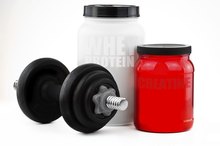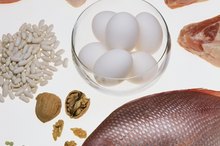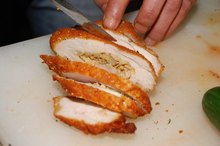What does fact checked mean?
At Healthfully, we strive to deliver objective content that is accurate and up-to-date. Our team periodically reviews articles in order to ensure content quality. The sources cited below consist of evidence from peer-reviewed journals, prominent medical organizations, academic associations, and government data.
- Journal of the International Society of Sports Nutrition: Macronutrient Intake in Collegiate Powerlifters Participating in Off Season Training
- Journal of the International Society of Sports Nutrition: Macronutrient Intake in Collegiate Powerlifters Participating in Off Season Training
- Journal of the International Society of Sports Nutrition: Protein Timing and Its Effects on Muscular Hypertrophy and Strength in Individuals Engaged in Weight-Training
- Journal of the International Society of Sports Nutrition: Protein Timing and Its Effects on Muscular Hypertrophy and Strength in Individuals Engaged in Weight-Training
- American College of Sports Medicine: ACSM Issues New Recommendations on Quantity and Quality of Exercise
- American College of Sports Medicine: ACSM Issues New Recommendations on Quantity and Quality of Exercise
- International Journal of Sport Nutrition and Exercise Metabolism: A Review of Issues of Dietary Protein Intake in Humans
- International Journal of Sport Nutrition and Exercise Metabolism: A Review of Issues of Dietary Protein Intake in Humans
- Academy of Nutrition and Dietetics: Strength Building and Muscle Mass
The information contained on this site is for informational purposes only, and should not be used as a substitute for the advice of a professional health care provider. Please check with the appropriate physician regarding health questions and concerns. Although we strive to deliver accurate and up-to-date information, no guarantee to that effect is made.
How Much Protein Do You Need When Lifting Weights?
If you’re an avid weightlifter, you likely need more protein every day than people who are sedentary. Too much protein, however, can cause nausea, diarrhea and fatigue -- and can negatively affect your workouts. Although protein supplements are convenient, they are often expensive and unnecessary. Alternatively, choose a variety of healthy foods rich in protein.
General Guidelines
Strength-trained athletes who engage in regular intense training need 1.5 to 2.0 grams of protein per kilogram of their body weight daily, according to a 2010 study published in the “Journal of the International Society of Sports Nutrition.” Because 1 kilogram of body weight equals about 2.2 pounds, strength-trained athletes often require 0.68 to 0.91 grams of protein per pound of body weight daily 12. Therefore, a 200-pound, strength-trained athlete would need 136 to 182 grams of protein each day.
Muscle Mass Gains
Health Benefits of Body Fortress Super Advanced Whey Protein
Learn More
If your goal is muscle mass gains, you require an adequate protein and calorie intake daily -- and a regular weightlifting regimen. A study published in 2012 in the “Journal of the International Society of Sports Nutrition” recommends weightlifters seeking muscle mass gains consume 0.55 to 0.91 grams of protein – and 20 to 22.7 calories – per pound of their body weight daily to increase muscle 256.
Minimum and Maximum Recommendations
Most weightlifters benefit from eating more than the protein recommended dietary allowance, or RDA, but should avoid exceeding maximum safe protein intakes. Protein RDAs, which should be treated as minimum requirements for weightlifters, are 56 grams for men, 46 grams for women and 71 grams of protein daily for pregnant and nursing women, according to the Institute of Medicine. Pregnant women, however, should avoid weightlifting unless their obstetrician gives them the OK. Maximum safe protein intakes are 2.5 grams per kilogram – or 1.14 grams per pound -- of body weight daily, according to a 2006 review published in the “International Journal of Sport Nutrition and Exercise Metabolism. 5”
- Most weightlifters benefit from eating more than the protein recommended dietary allowance, or RDA, but should avoid exceeding maximum safe protein intakes.
- Maximum safe protein intakes are 2.5 grams per kilogram – or 1.14 grams per pound -- of body weight daily, according to a 2006 review published in the “International Journal of Sport Nutrition and Exercise Metabolism.
Protein-Rich Foods
How Much Protein Should a Female Bodybuilder Consume?
Learn More
Although some protein supplements may contain 30 grams of protein – or more -- per serving, weightlifters can meet their daily protein needs by eating well-balanced diet. Lean red meat, chicken, turkey, fish, other seafood, eggs, soy products, milk, yogurt, cottage cheese, legumes, nuts and seeds are excellent sources of dietary protein. For example, 1 cup of low-fat cottage cheese provides about 28 grams and 3 ounces of chicken breast contain 27 grams of protein, according to the Academy of Nutrition and Dietetics 6.
Related Articles
References
- Journal of the International Society of Sports Nutrition: Macronutrient Intake in Collegiate Powerlifters Participating in Off Season Training
- Journal of the International Society of Sports Nutrition: Protein Timing and Its Effects on Muscular Hypertrophy and Strength in Individuals Engaged in Weight-Training
- American College of Sports Medicine: ACSM Issues New Recommendations on Quantity and Quality of Exercise
- International Journal of Sport Nutrition and Exercise Metabolism: A Review of Issues of Dietary Protein Intake in Humans
- Academy of Nutrition and Dietetics: Strength Building and Muscle Mass
- None
- None
- None
- None
- None
- None
- None
- None
- None
- None
- None
- None
- None
- None
- None
- None
- None
- None
- None
- None
- None
- None
- None
- None
- None
- None
- None
- None
- None
- None
Writer Bio
Erin Coleman is a registered and licensed dietitian. She also holds a Bachelor of Science in dietetics and has extensive experience working as a health writer and health educator. Her articles are published on various health, nutrition and fitness websites.









